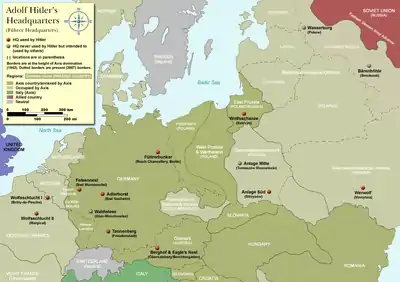مقر الفوهرر
مقر الفوهرر ( Führerhauptquartiere باللغة الألمانية )، والمختصر FHQ، عددًا من المقار الرسمية التي استخدمها الزعيم النازي أدولف هتلر والعديد من القادة والمسؤولين الألمان الآخرين في جميع أنحاء أوروبا خلال الحرب العالمية الثانية. [1] كان آخر استخدام، قبو الفوهرر في برلين، حيث انتحر هتلر فيه في 30 أبريل 1945، هو المقر الأكثر شهرة. المقرات البارزة الأخرى هي وكر الذئب (Wolf's Lair) في بروسيا الشرقية، حيث حاول كلاوس فون ستافنبرغ في رابطة مع متآمرين آخرين اغتيال هتلر في 20 يوليو 1944، ومنزل هتلر الخاص، البرغهوف، في أوبيرسالزبرغ بالقرب من بيرشتسجادن، حيث التقى كثيرًا مع كبار المسؤولين الأجانب والمحليين.

المقدمة

في بداية الحرب العالمية الثانية لم يكن هناك مقر دائم للزعيم الأعلى الألماني، الفوهرر. زار هتلر الخطوط الأمامية باستخدام أي طائرة أو قطار خاص له، وفوهررسونديرزوج. وبالتالي، يمكن اعتبار Führersonderzug كأول مقر ميداني. أول تركيب دائم أصبح مقر الفوهرر كان Felsennest، والذي استخدمه هتلر خلال معركة فرنسا في مايو 1940. قضى هتلر في الواقع القليل من الوقت في برلين خلال الحرب، والمساكن التي استخدمها بشكل متكرر كانت بيرغوف وولفشانزي، وقضى أكثر من 800 يوم في الأخير.
مواقع المقرات
كان هناك حوالي 14 مقرًا معروفًا لمقرات الفوهرر (حوالي 20 مقررة): [2]
| Name | Alternative designations | Location | Build started | Completed | Usage as Führer Headquarters |
|---|---|---|---|---|---|
| Adlerhorst | Mühle (OT) Bauvorhaben Z Lager K Bauvorhaben C |
Bad Nauheim, Germany | 1 Sep 1939 | yes | yes – used by Hitler during the Ardennes offensive; was too late for invasion of Poland, and Hitler told Speer it was too luxurious ... the Führer must show Spartan simplicity[3] |
| Anlage Mitte | Askania Mitte | Tomaszów Mazowiecki, Poland | 1 Dec 1940 | yes | no – only industry |
| Anlage Riese | none | Wałbrzych (Waldenburg), Poland | Oct 1943 | no | no |
| Anlage Süd | Askania Süd | Strzyżów, Poland | 1 Oct 1940 | yes | yes, Hitler met with Mussolini here on 27–28 August 1941 |
| Berghof | none | Obersalzberg, Berchtesgaden, Germany | ? | yes | yes – also thought by the Allies to be within an Alpine Fortress "last stand" territory of the Third Reich |
| Bärenhöhle[4] | none | Smolensk, Russia; Platform of Gniesdovo station lengthened for Führersonderzug[3] | 1 Oct 1941 | yes | no – used by Army Group Centre |
| Felsennest | none | Rodert, Bad Münstereifel, Germany | 1940 | yes | yes, used by Hitler during the Battle of France in May, 1940 |
| Führerbunker[5] | none | Berlin, Germany | 1943 | yes | yes, Hitler committed suicide here in 1945 |
| Führersonderzug | (a special train) "Amerika", "Brandenburg" |
various (movable) | 1939? | yes | yes |
| Olga | none | 200 km north of Minsk, Belarus | 1 July 1943 | no | no |
| S III | Wolfsturm, Olga etc. | Ohrdruf, Germany | Autumn 1944 (?) | no | no |
| Siegfried | Hagen[3] | Pullach, Germany (south of Munich) | ? | ? | no |
| Tannenberg | none | Freudenstadt/Kniebis, Germany | 1 Oct 1939 | yes | yes (27 June – 5 July 1940) |
| W3 | Wolfsschlucht III | Saint-Rimay, 15 km west of Vendôme, France | 1 May 1942 | no. | no. Built around a railway tunnel with armoured doors to protect the Führersonderzug, with bunkers for Hitler and for his staff at northeast entrance. Had anti-aircraft emplacements.[3] |
| Waldwiese | none | Glan-Münchweiler, Germany | 1 Oct 1939 | yes | no |
| Wasserburg | none | Pskow (Pleskau), Russia | 1 Nov 1942 | yes | no (assigned to Army Group North) |
| Werwolf | Eichenhain | Vinnytsia, Ukraine | 1 Nov 1941 | yes | yes; on 28 December 1943 Hitler ordered its demolition after failure of Operation Citadel[3] |
| Wolfsschanze[6] | Askania Nord, "Wolf's Lair" | Kętrzyn (Rastenburg), Poland | 1 Dec 1940 | yes | yes, site of the failed 20 July plot on Hitler's life |
| Wolfsschlucht I[7] | Brûly-de-Pesche near Couvin, Belgium | 1 May 1940 | yes | yes. A further bunker planned near the Wolfspalast (formerly the village inn) was not completed.[3] | |
| Wolfsschlucht II | W2, later Zucarello [3] | between villages of Margival and Laffaux, France. The Führerbunker was 2 km up the track from the Margival train station.[3] | 1 Sep 1942 | yes | yes. built around a railway tunnel with armoured doors to protect the Führersonderzug. The compound had six large bunkers; an OKW bunker was adjacent to the Führerbunker, also signals and guest bunkers and anti-aircraft emplacements. [3] |
| Zigeuner | Brunhilde | Thionville, France; used Maginot Line tunnels[3] | 1 Apr 1944 | no | no |
انظر أيضا
- المعقل الوطني (النازي المفترض " Alpenfestung " (جبال الألب)
- العمارة النازية
- Vorbunker
- خريطة الأماكن
المراجع
- ملاحظات
- Raiber, Richard, Guide to Hitler's Headquarters, After The Battle, No. 19, Introduction and p. 1.
- Raiber, Richard, Guide to Hitler's Headquarters, After The Battle, No. 19, p. 2.
- McNab 2014.
- Der Kommandant Führerhauptquartier نسخة محفوظة 2010-01-25 على موقع واي باك مشين. from Das Bundesarchiv (German, www.bundesarchiv.de) [وصلة مكسورة]
- The Berlin Führerbunker: The Thirteenth Hole, After the Battle نسخة محفوظة 2007-12-26 على موقع واي باك مشين., No.61 Special Edition (entire)
- Raiber, Richard, Guide to Hitler's Headquarters, After The Battle, No. 19, p. 28.
- Raiber, Richard, Guide to Hitler's Headquarters, After the Battle, No. 19, p. 10.
- بوابة الحرب العالمية الثانية
- بوابة ألمانيا النازية
- بوابة ألمانيا